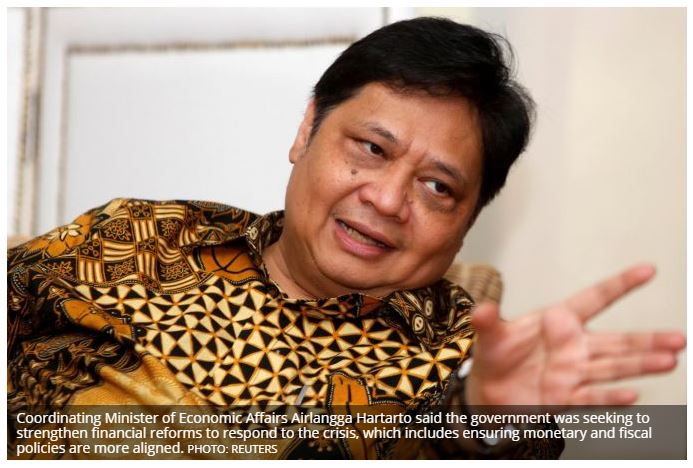Indonesian minister says economic policies must align better to tackle crisis
[JAKARTA] Indonesia must synchronise monetary and fiscal policies better to tackle economic pressures caused by the pandemic, although the government does not back a proposal for a monetary board to oversee the country’s central bank, a top minister told Reuters.
Coordinating Minister of Economic Affairs Airlangga Hartarto said the government was seeking to strengthen financial reforms to respond to the crisis, which includes ensuring monetary and fiscal policies are more aligned.
“We have to sail to the same direction,” Mr Hartarto said in a virtual interview late on Tuesday.
Financial markets have been rattled by concerns about the independence of Bank Indonesia (BI) after parliament started reviewing proposals from a panel of experts to revise the country’s 1999 central bank law.
The recommendations include creating a Monetary Council, giving ministers voting rights at BI’s policy meetings, allowing BI to fund fiscal deficits and adding economic growth and employment to its mandate, on top of price stability.
Analysts worry such moves risk pressuring BI to effectively keep printing money through debt monetisation. BI currently has a temporary agreement to fund part of the government’s Covid-19 response.
The concerns have knocked the rupiah, while a government bond auction on Tuesday received the lowest bids since April, amid fears the currency might weaken further.
Mr Hartarto, who is the chairman of Indonesia’s second-biggest political party Golkar, stressed that the recommendations had not been endorsed by any member of parliament and had not been discussed with government officials.
The government did not support the concept of a monetary board, he said.
However, regarding the expansion of BI’s mandate, Mr Hartarto said: “I think it is the role of both the government, fiscal and monetary policy … to stimulate the market in order to increase the growth and then reduce poverty, as well as to create employment.”
He reiterated President Joko Widodo’s pledge that BI would remain independent, but said the government wanted BI to be more synchronised with fiscal authorities “like your iPod to your speaker”.
Southeast Asia’s largest economy is officially forecast to post its weakest performance since the 1998 Asian financial crisis this year – within a range of a 1.1 per cent contraction to 0.2 per cent growth, as against 2019’s 5 per cent economic growth.
The government predicts a rebound to 4.5 per cent-5.5 per cent growth in 2021, but Mr Hartarto noted this assumed coronavirus vaccines would be rolled out from the first quarter of 2021.
The government has budgeted 37 trillion rupiah (S$3.43 billion) to procure enough vaccines for most of its 270 million people, including from China’s Sinovac and Sinopharm, he said.
Indonesian authorities have struggled to contain the outbreak with more than 200,000 cases now confirmed, while the death toll of 8,230 is the highest in Southeast Asia.
REUTERS


 English
English




